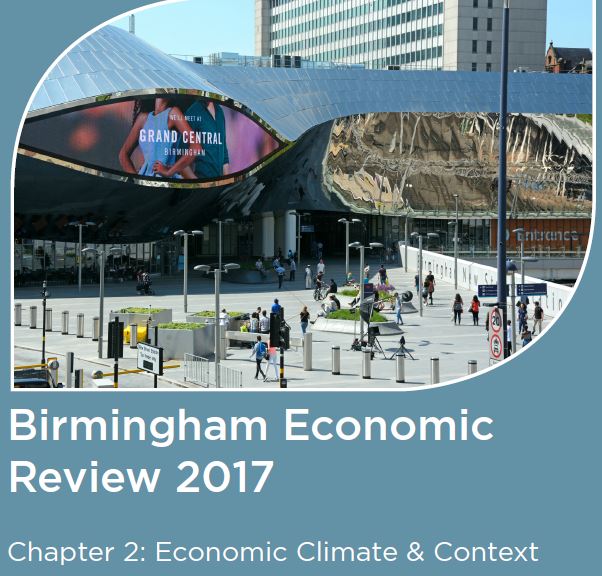The Birmingham Economic Review was produced in October 2017 by City-REDI, the Greater Birmingham Chambers of Commerce and the West Midlands Growth Company.
The review highlights the current strengths and weakness of the Birmingham economy, as well as looking at the opportunities and threats that might impact upon it in the future.
Over the next few weeks, we will be producing a series of blogs that provide an overview or comment on each chapter of the review, produced by members of the City-REDI team, colleagues from the University of Birmingham and businesses from the region. The first blog looks at chapter two of the Review:
Economic climate and context for Birmingham
Although the UK’s economy has remained one of the stronger economies in 2016, and the labour market continues to be strong with high employment rates, there is continuing concern that this is the wrong type of growth. As an economy, we are still too reliant on consumer spending which continues to grow to 2.8% in 2016. Inflation is also outstripping wage growth, which puts the consumer spending growth at risk and retail sales growth is showing signs of faltering in early 2017.
Low employment figures, the lowest for 42 years, hide a trend in the British labour market for empty self-employment, and zero hours contracts. It also raises a concern over why wages are not growing within such a tight labour market, seemingly against economic theory. This is happening globally. ONS estimates that real wage growth was actually 0.4% lower to the end of July than the previous year.
Against this backdrop, official figures show Birmingham’s economy grew strongly in 2015, with GVA standing at £24.8bn with a growth of 5.2% on the previous year. This gives Birmingham the second strongest growth amongst the 10 core cities, with the largest contribution to growth coming from distribution, transport, accommodation and food sector growing by 6.8% to £247m. The city also saw strong growth from business services up by 8.2% to £238m; finance and insurance also up by 8.2% to £178m and construction up by 11.8% to £159m.
The latest West Midlands Purchasing Managers Index (PMI) shows that the region had the 5th highest business activity index amongst the region, but is showing signs of slowing.
The general sentiment in the region is strong, the Chamber’s Quarterly Business Report for quarter 2 continues to emphasise a positive business outlook despite the current world and national climate. However, there are things to watch:
- Domestic demand may continue to fall, this qtr has seen a marginal drop from 135 to 15% reporting decreased domestic sales
- Competition continues to be a concern, followed by apprehension over exchange rates and business rates
- Exports so far in Birmingham have held up and with a marginal drop off in quarter 2, however, this mirrors the national picture where the falling pound has yet to materialise into sales
Birmingham city centre continues to grow with office take up in q1 2017, 39.9% up on q4 2016m with rents in the city centre also holding up despite this growth, demonstrating demand remains high. There are currently 25 schemes under construction in the city up on last year’s 9 and the 10 year average of 12 and the city was named the most investable city for the second year running by the Urban Land Institute on the back of HS2 and Curzon Street Regeneration. This makes for an interesting period, of local growth driven by investor optimism against a backdrop of national economic uncertainty.
To download a copy of the report, please click here.
This overview was written by Rebecca Riley, Administrative Director, City-REDI.
To sign up to our blog mailing list, please click here.

